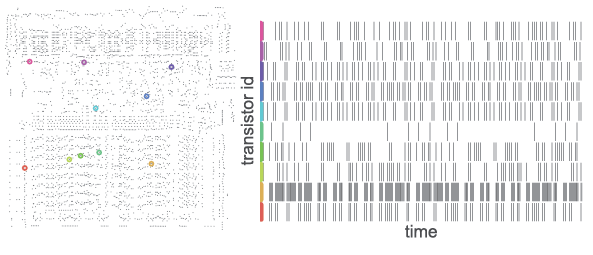
There is tremendous excitement in neuroscience about new experimental techniques and analytic methods under development. Scientists are recording from more neurons across more organisms than we would have dreamed possible a decade ago, and the Obama Administration’s BRAIN Initiative and projects at DARPA are trying to push that number to a million simultaneous neurons.
Making sense of such data is difficult since we still don’t really understand how even (comparatively) simple neural systems like the brain of a fruit fly work. Scientists currently lack a comprehensive understanding of how visual input presented to a fly will be processed by the fly’s brain to give rise to behavior. This makes it incredibly difficult to test our analysis algorithms – we don’t know if the algorithms will be useful, because we don’t have the data, and we don’t know if the data will be useful, because we can’t test the algorithms!
Our Could a Neuroscientist Understand a Microprocessor? project attempts to sidestep this issue by applying a large number of classical analysis techniques to a computing system that we do understand: A microprocessor from a classic video game system, the Atari 2600. Since humans have designed this processor from the transistor all the way up to the software, we know how it works at every level, and we have an intuition for what it means to “understand” the system. Our goal was to highlight some of the deficiencies in “understanding” that arise when applying contemporary analytic techniques to big-data datasets of computing systems.
Joint work with the always-amazing Konrad Kording
Press and general interest
Tests suggest the methods of neuroscience are left wanting Economist, Jan 21st 2017
What Donkey Kong can tell us about how to study the brain Science News, Aug 23, 2016
Understand the Brain? Let’s Try Donkey Kong First. In the Pipeline, June 3, 2016
Can a Neuroscientist understand Donkey Kong, let alone a Brain? The Atlantic, June 2, 2016
Could a neuroscientist understand a microprocessor? Marginal Revolution, May 29, 2016
Talks
- Eric speaking on the paper at the Redwood Institute for Theoretical Neuroscience on October 26, 2016
